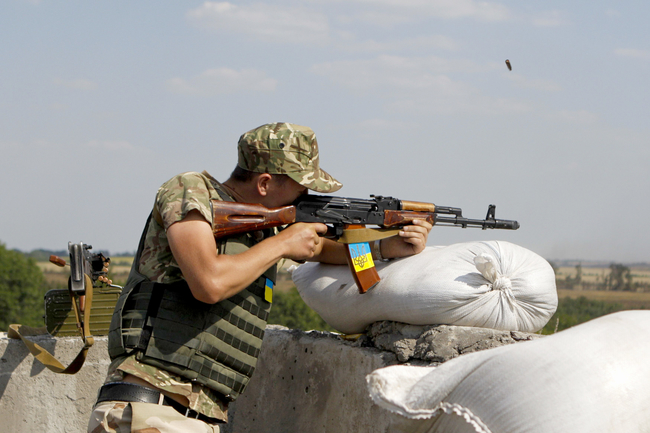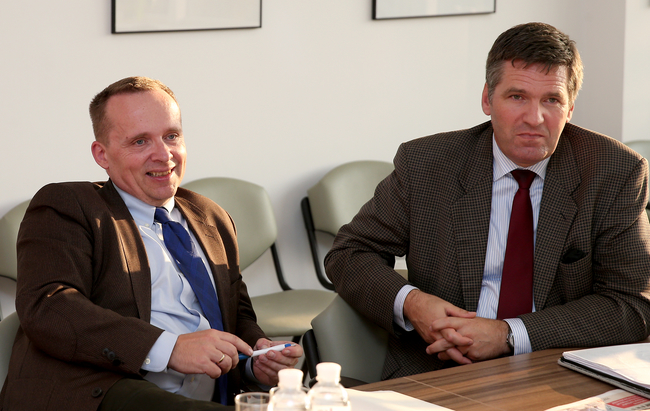“Putin must give Crimea and Donbas back”
Norwegian experts Tor BUKKVOLL and Kristian ATLAND visit Den/The Day’s office to share their views on the occupied territories
European countries cannot develop strategies of their policies without a detailed study of the situation that arose in Eastern Europe due to the Russian Federation’s aggression against Ukraine. Moreover, neither Ukraine nor NATO and Europe expected such a turn of events as we saw in the early 2014. It means that Western experts might need to radically revise not only intelligence, but approaches to analysis as well.
In this sense Putin very aptly used the surprise effect. Unpredictability has become an element of the efficiency of aggression, while thimblerigging of ideas provided a masterly cover to the Kremlin’s intentions. On the other hand, Putin did not invent anything special. He simply took advantage of the weakness of his opponent, who had swallowed the conflict in Georgia and made a load of blunders in foreign policy, first of all in Iraq. Even Putin’s statements questioning Ukraine’s statehood failed to attract proper attention or cause a response.
Just like Putin has for some time been overcome by a delusional belief that the so-called Novorossia is not just a figment of his imagination, but rather a potential prospect of severing Ukraine’s south-eastern regions, so the West still believes that Putin can be appeased in some way.
Recently The Day received Norwegian experts Tor BUKKVOLL, Senior Research Fellow leading Russian studies at the Norwegian Defense Research Establishment (FFI), Oslo, and Kristian ATLAND, Senior Research Fellow with the Norwegian Defense Research Establishment.
Our Norwegian guests justly see the sanctions not as a punishment for the Kremlin, but first of all a condition excluding the development of Russian defense industry to a higher technological level. Otherwise, it would pose a threat to the entire world. Yet they believe that with time Russia will nevertheless become a democracy. A deeper understanding of this controversial question would require plunging into history. Sadly, Russian mentality has remained unchanged for centuries. This is why even in the direst conditions Russians always demand a “tsar” to delegate responsibilities to, while the masses live in abject poverty.

AT DEN/THE DAY’S OFFICE NORWEGIAN EXPERTS SHARED THEIR VIEWS ON THE STRATEGY OF LIBERATING OCCUPIED TERRITORIES AND THE RELATIONS WITH RUSSIA. THE DAY PRESENTED THE EXPERTS WITH THE BOOK A CASE WITHOUT A STATUTE OF LIMITATIONS FOR A BETTER UNDERSTANDING OF UKRAINE’S PRESENT-DAY HISTORY / Photo by Ruslan KANIUKA, The Day
During its invasion in Donbas, the Kremlin actually prepared a sort of “welfare package,” with the population of the occupied territories totally dependent on the military authorities. Putin will never venture where he can meet stiff resistance. But both Donbas and Crimea had long been indoctrinated by the local strongmen, de-facto the Kremlin’s residents, about the alleged threat from the West and the possibility to return to the Soviet Union.
How can Putin be overcome? Let us have no illusions that Russia is capable of transforming itself on its own. Nowadays Russia is an aggressor state, something like Nazi Germany. We must not forget that the de-occupation of Europe in World War Two was only possible after the taking of Berlin, and the Nuremberg trial became an inoculation excluding a repetition of such precedents. Unfortunately, the Kremlin plays on the weaknesses of Europe and NATO, skillfully using democratic forms like referenda for its undemocratic ends. But the fact is that Russian tanks and Grad missiles destroy Ukrainian cities, and Russian troops and mercenaries chop off arms with the tattoo of the Ukrainian national emblem.
Objectively, Ukraine cannot liberate its occupied territories. Or more precisely, the price would be enormous. On the other hand, if there is no armed de-occupation, there is no diplomatic way, either. Diplomacy here can have only one form: the loser signs capitulation. Europe and NATO must understand in this situation that it is not Ukraine that is one of the parties to this conflict, but the world, and the global security system, which the aggressor seeks to destroy. As for Ukraine, today it defends Europe’s security and interests paying with its own blood.
So, how do the Norwegian experts see the situation in Ukraine’s east?
Tor BUKKVOLL: “We have been engaged in Russian and Ukrainian studies for 15 years now. However, I would like to mention that there certainly is a difference between experts’ perception of the developments in Ukraine and the perception of average Norwegians. For me, the situation in the east of Ukraine is quite obvious, it is an armed aggression. Most people in Norway also think that this is Russia’s armed aggression against Ukraine. There are some who think a bit different: mostly, these are from the extreme left. On the right wing there also are those who say, ‘You must understand Russia.’
“I have spoken a lot at various forums in Norway on the issue of Crimea, and very often I was asked: isn’t Crimea Russian land? Those people know nothing of Crimea’s complicated history. However, I answered that I could understand why Russians think that Crimea might belong to them. But at the same time, one must not forget Immanuel Kant who said that actions could be legitimate if they conform to a general law (act as you might wish everybody else to act).
“I told them that if you deem it right that any country has the right to take away a piece of a neighboring country when opportunity presents itself, then you are right saying that Crimea must belong to Russia.”
Kristian ATLAND: “I think that many Norwegians and Scandinavians were scared by what happened here more than two years ago, when a part of the country was occupied by Russia. Many were scared by Russia’s role in this conflict. On the other hand, Norway is a member of NATO, and we do not think Russia would do the same in the north of Norway. We also have Russian population, especially in the country’s north-east. But our Russians are well-integrated and do not seek to become part of Russia. Many in Norway, but also in Sweden and Finland worry about the developments in Ukraine. Finland and Sweden are now having debates about the possible NATO membership. I do not think that this will happen in the near future, but in the long term it is quite a realistic threat.”
What kind of way out of this situation do you see, in particular, considering Russia stopping its aggression in the east of Ukraine and restoring illegally annexed Crimea to Ukraine?
T.B.: “First of all, Putin must return all these territories. Second, Ukraine must rebuild its domestic situation as soon as possible, in order to become a normal democracy, free from corruption. Third, Ukraine needs to join the European Union as soon as possible. I doubt that Ukraine will be able to join NATO as long as Putin or his likes remain in power in Russia. It would be best probably if the West assisted Ukraine with armaments, so it could become a strong military power. This is exactly what could stop Putin from further ventures.”
K.A.: “At present the most important thing is the preservation of the sanctions. In my opinion, these restraining measures are working well and influence Russia’s behavior. That is why it would be wrong to lift them now. Norway has imposed the same sanctions as the EU. And if we used to have cooperation between Norwegian and Russian military, joint exercises and so on, now this is all on hold.”
Newspaper output №:
№52, (2016)Section
Day After Day





